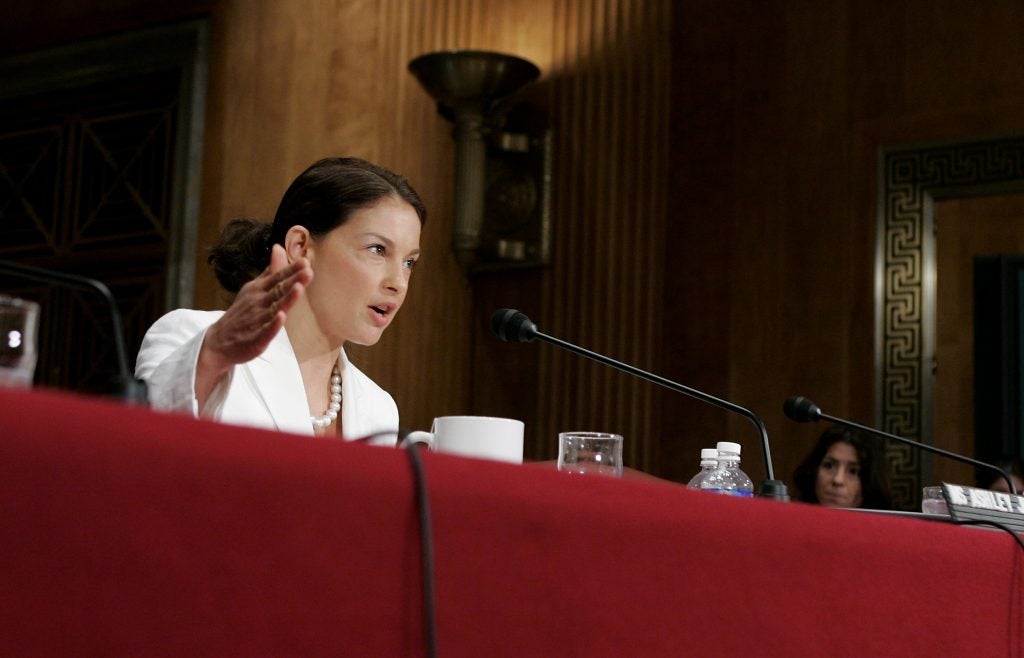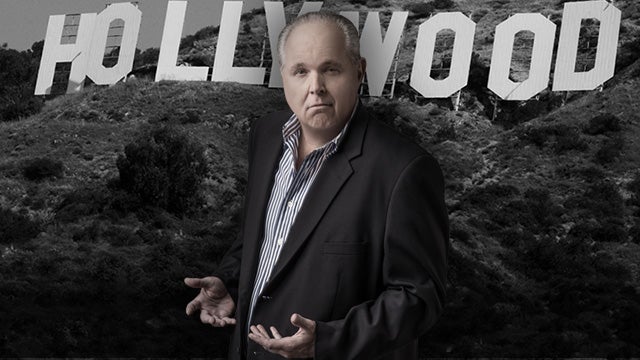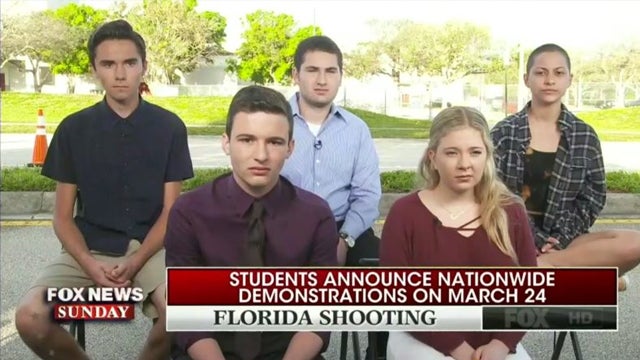RUSH: Here is Clayton in Midlothian, Virginia. Hi, Clayton. Glad you waited. You’re next on Open Line Friday. Hi.
CALLER: Hi, Rush. I love your show, and I and my kids, we love your books. Thank you for all of that.
RUSH: Thank you, sir, very much.
CALLER: You are welcome. The reason I’m calling, I’ve seen Hollywood actors that played roles in movies get called to be experts in front of Congress and I see people like Zuckerberg, and they turn into media bonanzas. And what I would love, is to see you up there sparring with these folks ’cause you’re an expert in everything.

RUSH: (laughing)
CALLER: The Republicans should have you up there sparring back and forth with these lunatic Democrats. I’m wondering if you’ve ever been asked to testify before Congress and would you go if so?
RUSH: I never have been, no. I don’t expect to ever be invited to testify before Congress. I think if you’re asked, you pretty much have to go. If they really want you and you don’t go, they can subpoena you, depending on what kind of hearings they are conducting. But, nope, I haven’t been.
CALLER: I’m wondering why that is, with all the years that people have been called before Congress that have no authority in anything, that the Republicans in particular wouldn’t call you up.
RUSH: ‘Cause I’m a media guy. Just like they wouldn’t call me to testify, they wouldn’t call Dan Rather to testify. They did have Howard Cosell testify about something to do I think the NFL at some point way, way back when Cosell was doing — But you brought up a fascinating thing. And it’s more than how the way we’ve always discussed it. You’re right that actors and actresses who play roles, who pretend to be something, have been called up to testify as experts, even though, by definition, they are not who they’re playing, they’re pretending to be people and all of a sudden they are accorded expertise.

It’s because movie stars are the closest thing we have to reality, and everybody’s a groupie. Alan Cranston was famous for having blonde actresses come up and testify just to be able to ask ’em out for lunch or some such thing. I’m not making that up. I could list you some names of the Hollywood actresses that Cranston was slobbering after back in the 1980s.
But I want to expand on this beyond just testifying before Congress. I want to run something by you all. This is a cultural thing that involves TV shows primarily. I need to ask you all some questions based on the fact that I don’t have kids. I’m gonna run the risk of — well, it’s not gonna make you mad. I’m probably not gonna be running any risks. But it’s coming up. Just thought of this.
BREAK TRANSCRIPT
RUSH: Okay. To the Hollywood business. I’ve gotta run something by you. It’s something I’ve observed. And I’m holding it in reserve because I’m not sure I’m qualified to make this judgment. What I’m doing is comparing prime time — well, not prime — television shows that I watch, either on network or cable, whatever, to shows I watched when I was younger growing up, when I was teenager, early twenties, young adult.
And what I’m observing today, it seems like — I need to really think about how I’m gonna phrase this. It seems like 80% of the plot line in most TV shows is worry and concern and fret over what’s happening to the children. And I don’t mean what’s happening to children in school. I just mean that the lives of the adult characters are totally, totally, totally determined by who their kids are, what their kids are doing, what they don’t want to do.

I’m still not getting this right. These shows are portraying — let me put it this way — parents who are just entirely weak and incapable of living their own lives, not governed by their kids. Now, the reason that this concerns me is because images in mass media have a way of influencing and affecting the broader culture. And in the process, kids in TV shows today, are being portrayed as having more wisdom and of having a greater importance and more knowledge than their parents.
The parents are being portrayed as incapable of treating their kids — the parents are portrayed as being totally — I need to think about — I’ve thought about it in my head, and the words are clear as the day in my head. Now that I’m trying to express them, I’m running into trouble. It just seems that the parents have become wusses, the kids are wusses, everybody’s wusses. And the parents, it seems like the plot of every show is devoted to concern and worry about the kids.
And I think back to TV shows when I was younger, and, A, there weren’t as many of these family shows as there are now. Of course, there weren’t as many shows, period. Only three networks back then. But it just seems to me that this “for the children” thing has overtaken everything. Now, it could be it’s always been this way and I just have never noticed it because, of course, I don’t have any kids, and there are none living in my house, so I’ve never been a parent.
But the way all of this is portrayed on TV shows is weak parents who are incapable of doing anything if their kids don’t want them to or if their kids don’t like it. They don’t have lives. The adults in many of these shows have no lives of their own. Everything is about the kids. This still doesn’t get to the point that I’m trying to make, though. This may take me a couple of stabs here, folks.
BREAK TRANSCRIPT
RUSH: I’m gonna keep trying to find a way to express what I’m actually talking about here. The last couple episodes, like Law & Order SVU — well, still not the best example. But it’s just you don’t have any adult-only storylines anymore. Within every adult storyline is a missing kid or something’s wrong with the kid. And the parents in these stories are portrayed as jelly, as incapable of dealing with any aspect of life involving their kids unless it is 100% perfection.
 The kid brings a report card home from school, got some C’s on it, and it takes over the storyline, becomes a panic attack and so forth. I don’t know. Well, the reason it concerns me is the effect it all has on mass culture. And I love kids like everybody else does. But they’re not old enough and smart enough, wise enough and experienced enough to be running things, by definition. And it bothers me when they are portrayed as being smarter and wiser.
The kid brings a report card home from school, got some C’s on it, and it takes over the storyline, becomes a panic attack and so forth. I don’t know. Well, the reason it concerns me is the effect it all has on mass culture. And I love kids like everybody else does. But they’re not old enough and smart enough, wise enough and experienced enough to be running things, by definition. And it bothers me when they are portrayed as being smarter and wiser.
We see it in the school shooting thing. I mean, it’s part and parcel of the way the story is being covered. “They know more about guns than the adults do. They know more than the NRA!” It’s impossible. They couldn’t possibly. Most of them don’t know what they’re talking about yet, but you can’t say that because they were shot at. They’re traumatized. You can’t talk about ’em in that light.
So when you bring up the kids or you put ’em in the story line, you cannot be critical of it. “They’re children, Mr. Limbaugh. You must understand.” That’s my point. They’re being used to shut people up. They’re being used to stop the proceedings of common sense. They’re being used to turn people on television shows into jelly, quivering masses of fear.
BREAK TRANSCRIPT
RUSH: Let me try this kids thing one other way, folks. I’m actually gonna have to sit down and rather than do this off the cuff, I’m gonna have to jot down some one-line thoughts so that this makes sense because I have not yet nailed what concerns me. Let me give you an example from a TV show I’m watching. It was Law & Order SVU, and one of the lead characters has an adopted son.
And the adopted son, of course, stays at home with a nanny or babysitter while the lead character’s out catching rapists and so forth. And one day the nanny calls and says, “Noah this, this, or that. Noah’s very upset. Noah’s crying.” So the lead character says, “Oh, my God, I gotta come home! I gotta come home! Noah is crying! I gotta go home!” I’m saying, “Come on! Who leaves work to go home because the kid is crying — or do they?” That’s what I’m asking. Does that happen now? If you go in to your boss and say, “My daughter’s at home and the nanny says she’s crying.

“I gotta go,” does the boss say, “Oh, my God, get outta here! You can’t have that. Your daughter’s crying? You gotta go track that down.” Does that…? Snerdley, if you went in and you told that to me and said… Well, no, we can’t use me because (chuckles) I’d tell you to cram it. But it’s that kind of stuff I’m talking about, that adults are unable, in these TV shows, to deal with their kids’ suffering anything. When it happens, it’s an emergency, and they’ve gotta drop everything to deal with it?
And if you raise kids like that, they would never grow up.
They would never learn anything. If you treat them like a baby pet for their entire life, that’s what they’re gonna end up being. (interruption) Snowflakes? Yeah. Okay. Maybe we’re seeing… Yeah, that’s what concerns me. We’re seeing the manifestation. We’re seeing 18-, 19-, 22-year-olds that are in college, and the administrators and the parents are letting them act that way — and the parents and the administrators are acting subservient to a bunch of five-year-old kids that are running around in 20-year-old bodies.
And you see this on television all the time now. Your snowflake example, that’s exactly what I was thinking about where it leads. If you don’t let ’em grow up, they’re not gonna grow up — and if you don’t let ’em grow up, they’re gonna still be living with you when they’re 35. And you’re gonna end up making excuses for ’em. “Well, it’s really hard out there, you know. It’s tough! It’s a lot tougher than when your mom and I were growing up.” No, it’s not. How are they ever gonna be able to provide for themselves and be self-sustainable if you don’t let ’em learn how?


